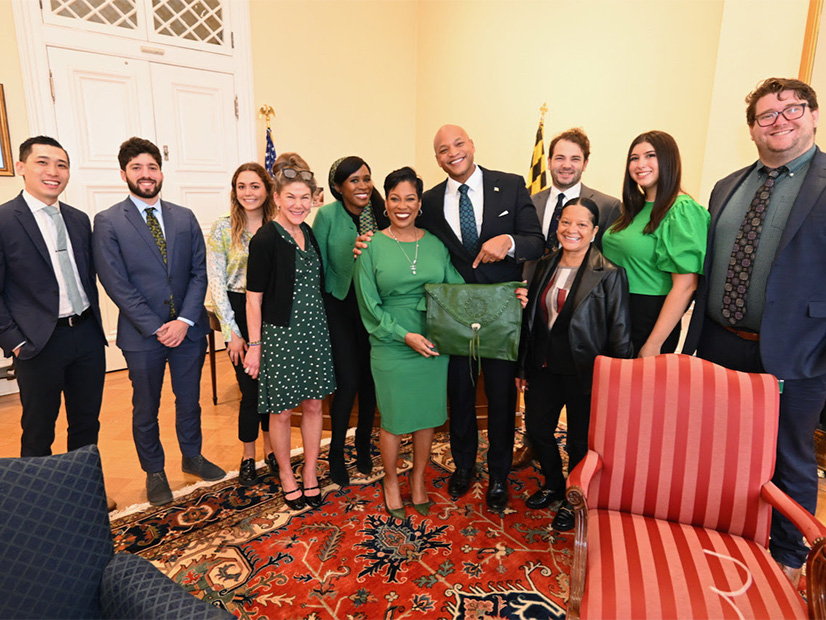
Maryland Gov. Wes Moore (D) has nominated a consumer advocate to head the Public Service Commission and a gas industry advocate to fill one of two other soon-to-be open seats on the commission.
As part of his “Green Bag” nominations sent to the Maryland Senate on Friday, Moore’s PSC nominations included Frederick H. Hoover Jr., assistant people’s counsel in the Office of the People’s Counsel (OPC), and Juan Alvarado, senior director of energy analysis for the American Gas Association.
Hoover will be replacing outgoing PSC Chair Jason Stanek, who was appointed by former Gov. Larry Hogan (R) and whose term expires on June 30, according to a spokesperson for Moore. Alvarado will take the seat of either Commissioner Patrice Bubar or Commissioner Odogwu Obi Linton, both of whose appointments were rescinded by Moore last month, the spokesperson said.
Bubar and Linton were also appointed by Hogan but have remained unconfirmed by the Senate. They were among the 48 appointments by Hogan that Moore rescinded, with no explanation, in a Jan. 23 letter to Senate President Bill Ferguson (D). Similarly, he provided no explanation for his PSC nominees, which were just two of the 307 names sent to the Senate in the Green Bag.
Moore could make a third nomination to the PSC later in the legislative session, according to Maryland Matters. Bubar and Linton will continue to serve on the commission until their replacements are confirmed by the Senate and sworn into office.
Maryland’s Green Bag is a tradition that dates back to 17th century England, when lawyers carried their papers in green bags, according to an article in a 2004 State Archives newsletter. The current Green Bag is hand-crafted leather, embossed with the state seal, kept in the archives.
While once seen as a symbol of political patronage — green being the color of money paid for such appointments — today the bag, containing a list of gubernatorial appointments, is delivered to the General Assembly on 40th day of its legislative session, as set in state law in 1851.
Moore boasted that the 307 appointments sent to the Senate on Friday represent a truly diverse Green Bag, with women accounting for 57% of nominations and people of color comprising 45%.
Climate activists had hoped Moore’s rescission of Bubar’s and Linton’s nominations — and the end of Stanek’s term in June — would be an opportunity for the new governor to reshape the PSC and further advance his vision for Maryland’s electric system to be powered 100% by clean energy by 2035.
But the choice of both Hoover and Alvarado could signal a more centrist, pragmatic position.
So Who Are They?
Hoover’s record can only be pieced together from a number of media reports and online research. He led the Maryland Energy Office during the administration of former Gov. Paris Glendenning and was the agency’s deputy under former Gov. Martin O’Malley, both Democrats. Following Hogan’s inauguration in 2015, he worked as a senior program director for the National Association of State Energy Officials.
He has been at the OPC at least since 2020. During that time, the office has pushed the PSC to take stronger action against the gas industry. In early February, for example, the office petitioned the PSC to curb ongoing investment in new gas infrastructure by Maryland utilities.
“Maryland’s gas utility operations, massive infrastructure spending and long-term plans conflict with market trends, state climate policy and the interests of customers,” the OPC said in a Feb. 9 press release on the petition. “To address the conflict, the commission should promptly initiate proactive, comprehensive regulation to manage the transition to a new age, broadly acknowledged, in which gas will play a far diminished role.”
Hoover has also served as past board chair of the League of Conservation Voters, according to Kim Coble, the organization’s executive director, as reported in Inside Climate News.
Hoover’s “experience in clean energy and his commitment to addressing climate change will be valuable assets to the PSC,” Coble told Inside Climate.
However, she also raised concerns about Moore’s nomination of Alvarado. Having a gas industry official on the commission “could present a challenge to the PSC’s efforts to advance utility and transportation services while also respecting the significant and unique role the commission plays in advancing the state’s climate goals and specifically the governor’s 100% clean energy goal,” she said.
Alvarado’s LinkedIn resume lists a 12-year stint at the PSC from 2008 to 2020, including seven years as the director of its Telecommunications, Gas & Water Division. Since 2020, he has worked as director and then senior director of energy analysis at the AGA.
In a recent promotional video for the AGA, Alvarado says that the replacement of coal with gas has been responsible for a major reduction in U.S. greenhouse gas emissions. “It’s going to be an integral part of further reducing emissions in the future, to the point where I think it can one of the paths to zero net emissions,” he says.
A spokesperson for Moore defended both PSC nominations, citing the nominees’ decades of administrative experience and knowledge of the energy industry, as reported by Inside Climate. “The administration is confident that these individuals will work tirelessly to ensure safe, reliable and economic public utility and transportation service to the citizens of Maryland,” the spokesperson said.



